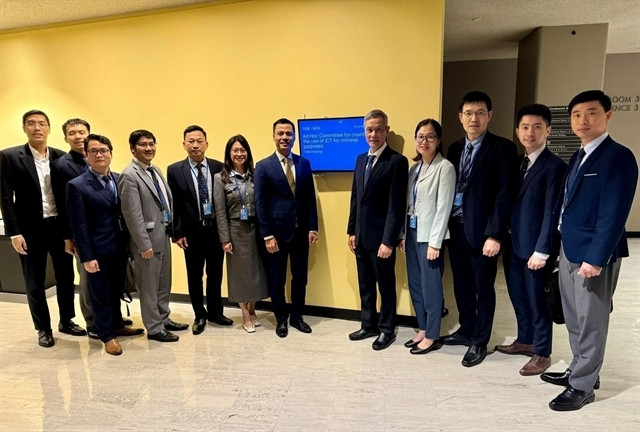 |
| The Vietnamese delegation at the United Nations (UN) Ad Hoc Committee on Cybercrime's meeting in New York. — VNA/VNS Photo Thanh Tuấn |
Việt Nam welcomes the United Nations (UN) Ad Hoc Committee on Cybercrime’s adoption of the draft UN Cybercrime Convention as an important first step for the UN General Assembly to consider and adopt it, said Nguyễn Minh Vũ, Assistant to the Minister of Foreign Affairs of Việt Nam.
Addressing the committee’s meeting in New York on Thursday (local time), during which participants approved the draft, Vũ said that when it enters into force, the convention will provide the first global legal framework to help promote cooperation among countries in responding to the threat of cybercrime.
Việt Nam was one of the countries that showed early support to the establishment of the Ad Hoc Committee and actively participated in the process of building the convention from the first session, he noted.
The official said that throughout the committee’s eight sessions, the Vietnamese interdisciplinary negotiation delegation led by Ambassador Đặng Hoàng Giang, Permanent Representative of Việt Nam to the UN, made substantial and positive contributions which were recognised and highly appreciated by the Presidium, international friends and partners.
The document sets out a comprehensive legal framework for member countries to conduct international cooperation in preventing, investigating, prosecuting, and adjudicating cybercrimes, including computer system attacks, online fraud, illegal dissemination of sensitive images, child abuse, and money laundering.
Law enforcement agencies of countries can carry out cooperation activities through various channels, ensuring quick and timely responses and meeting the need to effectively prevent cybercrime, according to the document.
One of the notable contents of the draft convention is the mechanism for technical assistance, capacity building, and technology transfer to meet the demands of developing countries.
Due to the borderless nature of cybercrime, the above provision is expected to enhance the science and technology capacity of developing countries to respond more effectively to the threat of cybercrime, thereby contributing to creating a healthier and safer global cyber environment.
The process of developing the convention was expected to end in February after seven sessions of the Ad Hoc Committee. However, discussions were extended to the eighth session.
The UN General Assembly is scheduled to consider and adopt the draft convention in the near future. Once adopted by the General Assembly, it will become the first global legal document aimed at suppressing criminal acts in cyberspace. — VNA/VNS